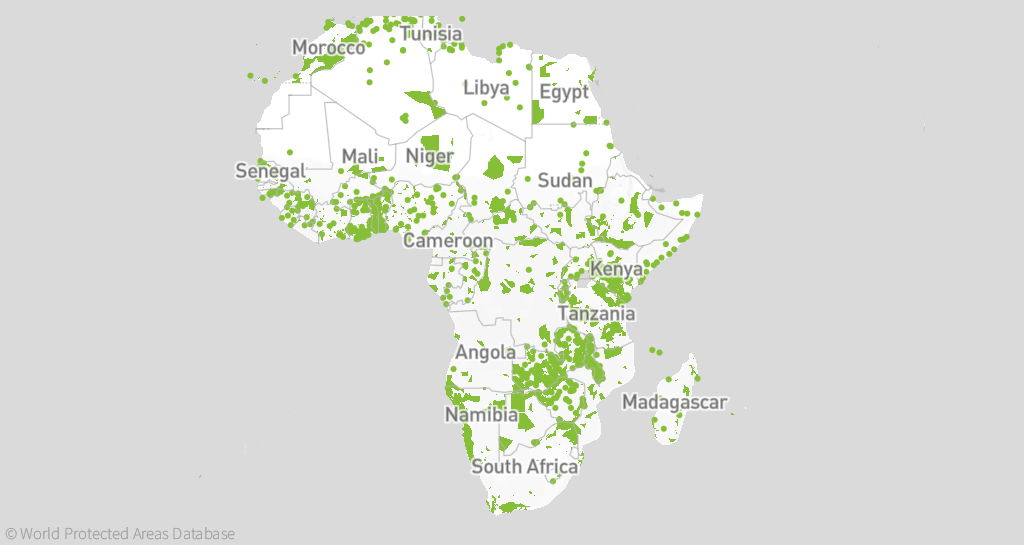
Much has been said and written about the devastating effects of COVID-19 on global economies, with the inevitable socio-economic impacts on all sectors of life and industry. The situation is not projected to improve any time soon, and for the already underfunded conservation industry in Africa, it spells disaster. A new report by renowned conservationists and scientists examines just how bad COVID-19 could be for Africa’s wildlife and protected areas and what needs to be done to save our wild spaces.
According to the report, Africa has nearly 2000 Key Biodiversity Areas and supports the world’s most diverse and abundant large mammal populations, with wildlife-based tourism generating over $29 billion every year and employing 3.6 million people. 7,800 terrestrial protected areas cover some 17% of the continent, most of which are state-owned but with considerable support from conservation NGOs and the private sector. Expanding conservation efforts on private and community land has seen increased available habitat for wildlife while simultaneously creating buffer zones. Vast transfrontier conservation areas protect wilderness areas across national boundaries.
From bad to worse
Even before COVID-19, Africa’s conservation industry was facing a crisis. The report states that state-owned protected areas with lions are repeatedly faced with budget deficits of $1.2 billion every year, with most other protected areas likely faring no better. This, in turn, renders these regions susceptible to the main threats facing wildlife today: habitat loss, degradation, fragmentation, encroachment, poaching and climate change, which, combined with poor governances, poverty, climbing human populations and the illegal wildlife trade, are driving wildlife declines. And the authors believe that this current pandemic could amplify this crisis to catastrophic effect.
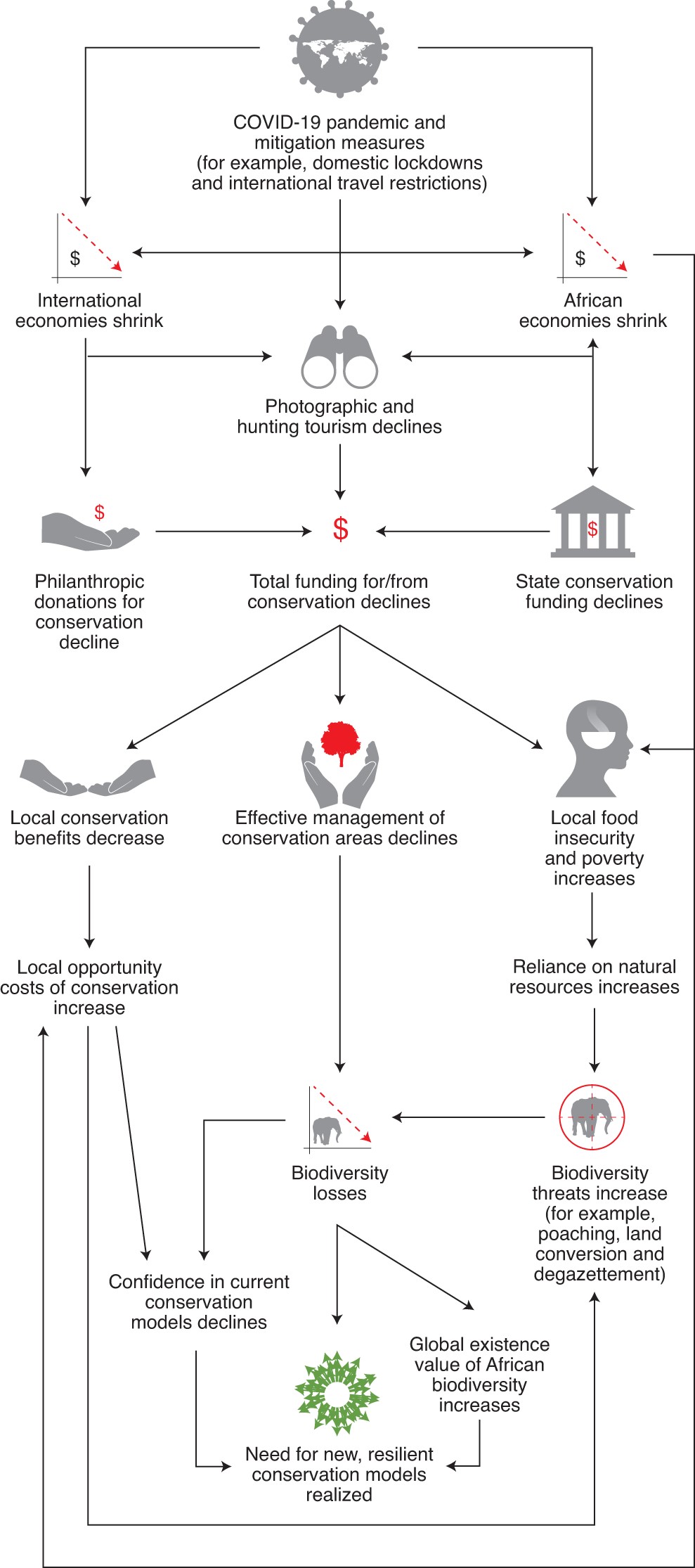
While there have been limited positive environmental benefits to the global shutdown, these are temporary, and the ultimate impact will be strongly negative, with reduced funding, lower conservation capacity and increased threats to wildlife and ecosystems.
The effects
- Reduced conservation funding:
As governments are faced with having to make severe budget cuts, there is a strong likelihood that wildlife authority budgets (already underfunded) are going to be substantially reduced. The impact of COVID-19 on the tourism industry is being felt on an unprecedented scale, and 90% of African tour operators have seen an over 75% decline in bookings. For most countries, tourism is the most significant contributor to protected area financing, and the loss of this revenue is going to have major ramifications. Aside from the day-to-day conservation activities, the lost revenue threatens jobs and livelihoods for some of the most impoverished communities on the continent.
Reduced donor funding is also inevitable, as economies struggle to recover, and corporations, private donors and foundations are unable to provide or may shift their focus to humanitarian causes. During the financial crisis of 2008/9, conservation endowments declined by 40%.
- Impaired conservation operation
Reduced funding will restrict the capacity of conservation and management authorities to manage protected areas as necessary, as well as forcing the loss of staff members and preventing the purchase of necessary equipment and supplies. In areas where movement has been strictly restricted, rotating staff and supplying field rangers has proved difficult, resulting in exhausted staff and poor morale.
- Increased conservation threats
The disastrous effects on tourism and the overall negative economic impact will increase rural poverty. The authors expect increased poaching, tree cutting, artisanal mining, encroachment, agricultural conversion and even the degazetting of severely affected protected areas.
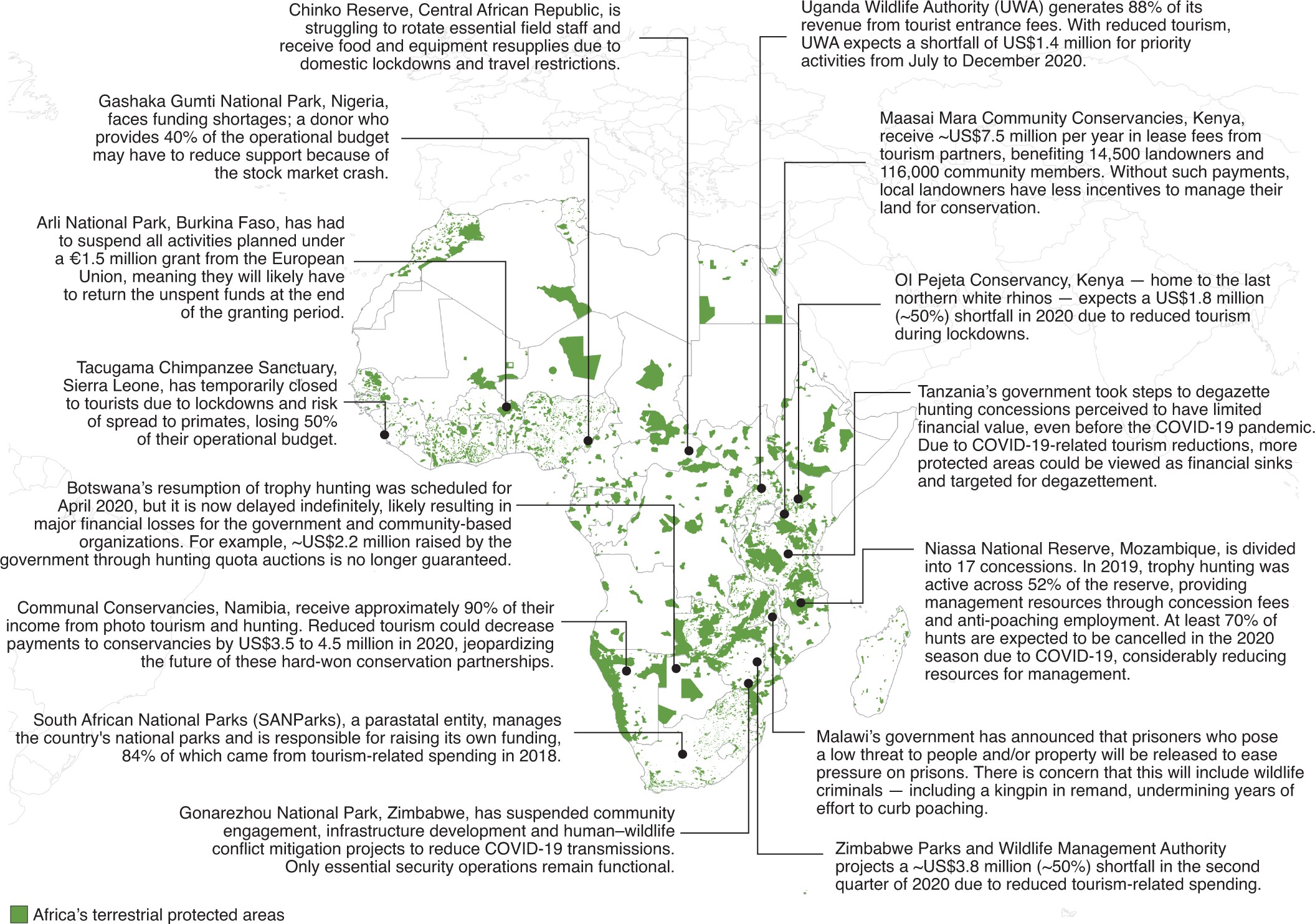
- Risk of future outbreaks due to human impacts on nature
The report suggests that the combination of reduced conservation efforts and increased poverty could create a positive feedback loop where increased reliance on natural resources increases encroachment, exposure, and consumption of wild animals, ultimately increasing the risk of future pandemics.
What can be done?
The authors emphasise that a long-term perspective is essential – supporting conservation efforts will help local economies recover and create employment, especially as the tourism industry begins to bounce back. The report highlights three significant actions needed to mitigate these effects:
- Manage the immediate crisis
The international community needs to intervene to provide crisis funding by recognising conservation as an essential service, and, realistically, this primary source of funding needs to be the developed world, as many governments in developing countries lack the capacity. This could involve donors creating an emergency fund for wildlife authorities, communities, private landowners, and conservation NGOs. The tourism industry, which underpins the conservation industry, needs support both in terms of tax breaks and direct financial assistance.
- Defend against future disease outbreaks by regulating wildlife trade and minimising habitat loss
Governments and organisations across the world need to improve regulations and improve the enforcement of existing laws to curb unsafe wildlife trade practices that jeopardise either human health or conservation objectives. The authors do warn against undermining the legal, regulated wildlife trade that supports millions of livelihoods.
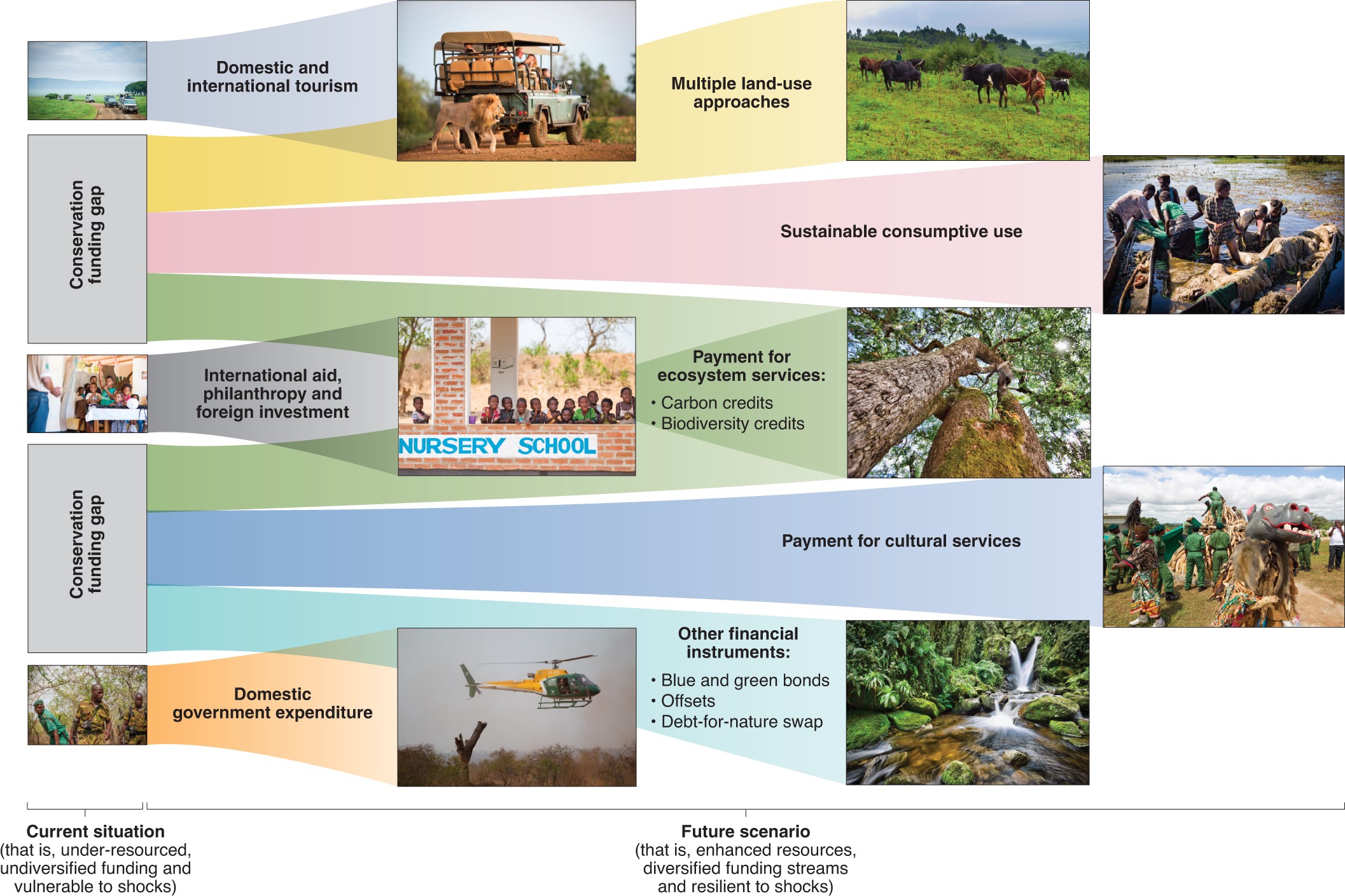
The report also suggests that efforts should be made to tackle other drivers of infectious disease such as habitat destruction, logging, and mining.
- Address systematic flaws in the structure and function of conservation in Africa
Here the report suggests that COVID-19 has exposed the multifaceted shortcomings of conservation efforts in Africa, starting with the fact that funding is inadequate and reliance on short term, external funding streams is not sustainable. While tourism plays an enormous role, some countries are over-reliant on it for conservation funding, which makes efforts vulnerable to stochastic events such as pandemics. In areas where tourism does flourish, the communities that carry the cost of wildlife generally receive negligible benefits.

Increasing conservation resilience
The report suggests that this is an opportunity to rethink and restructure conservation funding in Africa to promote long-term resilience, with suggested solutions that would need to be tailored depending on the specific situation:
- Recognise the reliance on the development of natural assets – that is, aligning conservation and development interests to build political and public will.
- Quantify the value of natural assets and ecosystem services and incorporate those values in national budgets
- Position protected areas as hubs for local development and service provision
- Properly engage local people as stakeholders in conservations – allow communities to participate in protected area governance and ensure that communities benefit from tourism.
- Encouraging conservation organisations to work with development specialists on visible support for communities
- Support African civil society conservation efforts
Given that travel restrictions currently limit international conservation organisations, they should be supporting local conservation organisations by providing funding and sharing expertise which will increase local conservation capacity.
- Diversify revenue-generating options from wildlife areas
The demonstrated volatility of international tourism, as well as the decline in trophy hunting, illustrate the need to create local revenue streams more resilient to global shocks. For some countries, that means fostering domestic tourism to increase resilience to global shock and build longer-term public support for conservation. The report also warns that, given current deficits, the collapse of the trophy hunting industry would have grave ramifications for conservation.
- Increase domestic expenditure
African governments need to invest in protecting their assets – this could entail setting aside a budgetary allocation for the protection of nature.
- Increase international funding
There are emerging mechanisms for international governments, organisations, and individuals to provide funding, including investment in land, payments for ecosystem services or debt-for-nature swaps.
- Improve revenue distribution mechanisms
Africa needs to improve the mechanisms used to generate and disburse wildlife-related revenue in a way that recognises the role of governments, private landowners, and communities as custodians of wildlife.
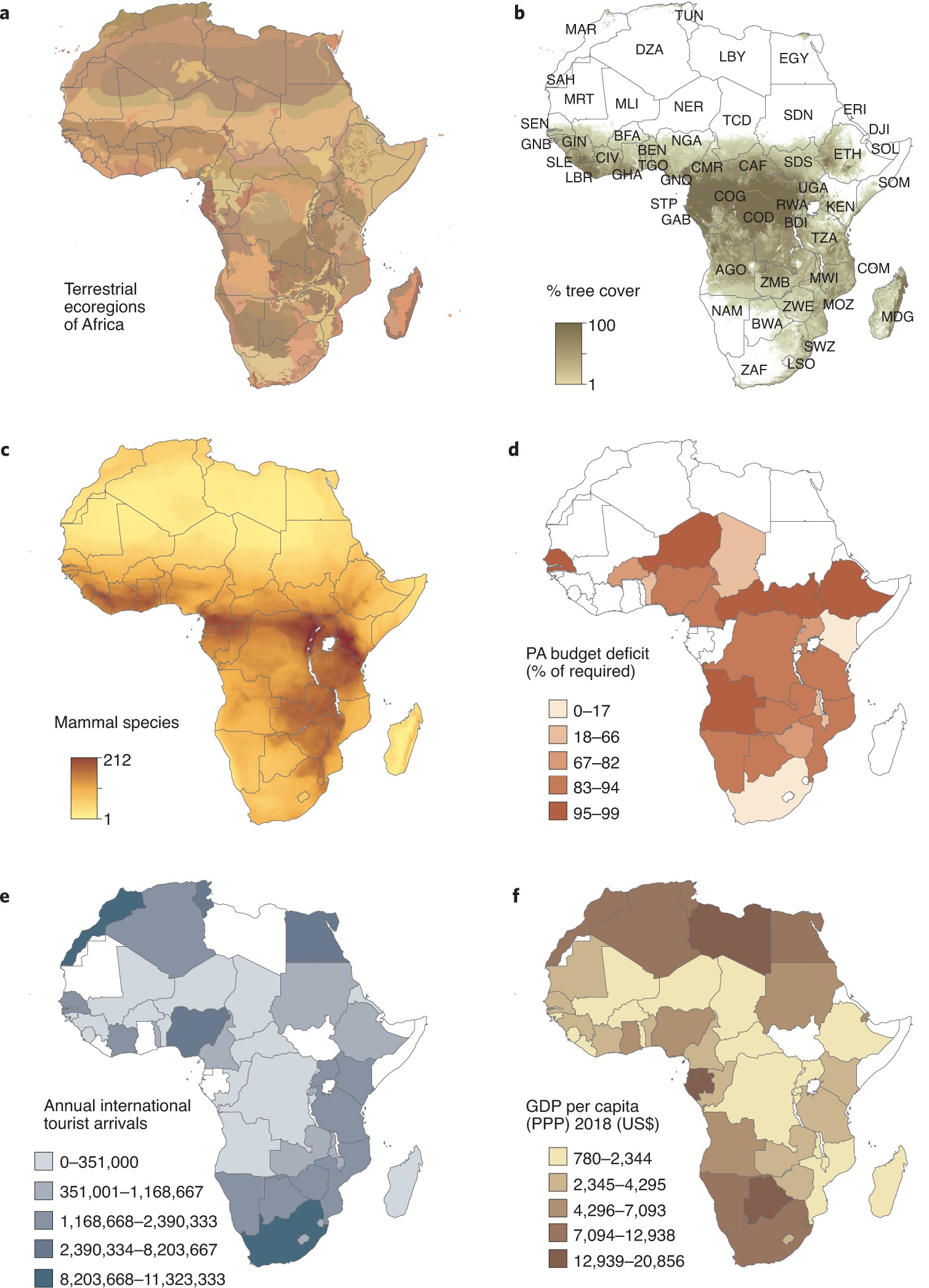
Conclusion
The authors of this report are some of the most prominent coal-face conservationists and scientists in the industry, and their sombre warnings carry significant weight. They conclude that the international community needs to act fast to protect and support Africa’s wildlife and protected areas, as well as the people who depend on them. This concerted effort will need the support and collaboration of the developed world, African governments, donors and conservation practitioners. “At this critical juncture, business, as usual, could be catastrophic, but decisive and collaborative action can ensure that Africa’s wildlife survives COVID-19 and that more resilient conservation models benefit humans and wildlife for generations”.
The above is a summary of an extensive report, and the full article can be accessed here: “Conserving Africa’s wildlife and wildlands through the COVID-19 crisis and beyond”, Lindsey, P., Allan, J., Brehony P., et al (2020), Nature Ecology & Evolution![]()
To comment on this story: Login (or sign up) to our app here - it's a troll-free safe place 🙂.![]()








